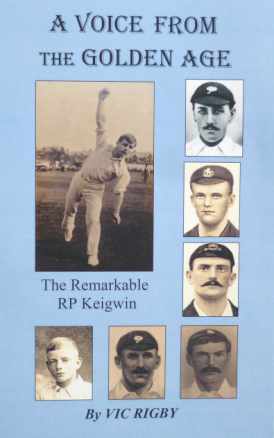A Voice From The Golden Age
Martin Chandler |Published: 2020
Pages: 175
Author: Rigby, Vic
Publisher: JW McKenzie Ltd
Rating: 4 stars

It is a while ago now that I first learnt that a biography of Richard Keigwin was being written, and it was a cause of some celebration when a copy of the book finally dropped through my door recently. My first thought was that whilst the title is a splendid one for a cricket book it was, given that Keigwin died almost fifty years ago, slightly misleading. I rapidly found out that that initial impression was wrong.
A Voice From The Golden Age is published by book dealer John McKenzie who, I learnt from author Vic Rigby’s acknowledgments and the foreword that he himself contributes, had met up with Keigwin on a number of occasions in the late 1960s and also exchanged a number of letters over that period. It is the content of those letters and John’s recollections of his meetings with Keigwin that give the book’s title its legitimacy.
So who was Richard Keigwin? As a cricketer his achievements are relatively modest, however he played the First Class game as an amateur over twenty years, albeit 57 of his 74 appearances came in the initial years, 1903 to 1906, when he was reading classics at Cambridge University and also played for Essex. After the Great War Keigwin played ten times for Gloucestershire.
Initially Keigwin was a bowling all-rounder with a bowling style the man himself described as a slow medium out swinger with a very small off break, but his batting soon became his stronger suit. He recorded one century and a dozen fifties over his career, all but one of those scores coming during his student days. That one is an important factor in the book however as it sparked John McKenzie’s interest in Keigwin. When Warwick Armstrong’s all-conquering Australians came to Cheltenham in 1921 Arthur Mailey took his famous 10-66 in the county’s second innings of 175, and the by then 38 year old Keigwin comfortably top scored with 65.
Cricket was not, of course, the only string to Keigwin’s bow. To start with he had other sporting talents. He kept goal three times for England at hockey, was awarded blues for rackets and football as well as cricket, and played tennis at county level. Keigwin’s main career was in teaching, but he was a talented linguist and a noted authority on the works of Hans Christian Anderson with whose home country, Denmark, he had a lifelong affinity. Not least of his accomplishments in Denmark was his role in fostering an interest in cricket there. If that were not enough Keigwin also served with distinction in the Royal Navy Volunteer Reserve in the Great War.
So the story of Richard Keigwin is an interesting one on many levels, but the primary appeal to cricket lovers are his precious cricketing memories which begin in 1899 when he was present at Clifton College to watch the famous unbeaten 628 that AEJ Collins scored in a junior house match. From his own playing career there were matches played with or against some of the great names of the era before his own. He played against the legendary Surrey and England fast bowler Tom Richardson and with the equally legendary Charles Kortright, who many who saw him declared to be the fastest ever. Also on Keigwin’s cricketing CV was the name of WG Grace, a memorable opponent even if, as with Richardson and Kortright, Keigwin’s path crossed theirs at a time when their best days were behind them.
At their peak Keigwin encountered men like Wilfred Rhodes, Colin Blythe, CB Fry, Ranji and even the great Philadelphian, Bart King. Keigwin also played in a famous match between Essex and Derbyshire at Chesterfield in 1904 when his teammate Percy Perrin scored 343, yet ended up on the losing side.
All in all A Voice From The Golden Age is an excellent book. There is a well written account that comprises 144 of the 175 pages with a number of nicely reproduced photographs. The remainder of the page count comprise Keigwin’s career statistics, a bibliography, the text of a letter written by Keigwin to the writer/historian James Coldham in 1954 and, in the main, the text of the letters received by John McKenzie. It is a matter of slight regret that John’s side of the correspondence was not retained, but I don’t suppose that when he wrote it he imagined for one moment that a book would follow half a century later. It is also worth making the point, for those to whom financial considerations are important, that at £15 directly from the publisher the book represents good value as well. Its purchase is recommended.






Leave a comment